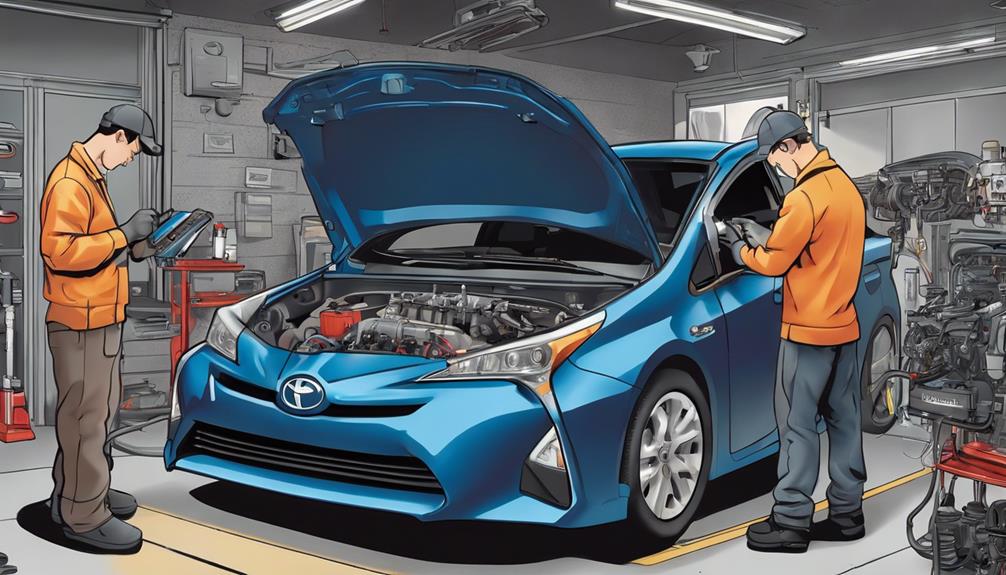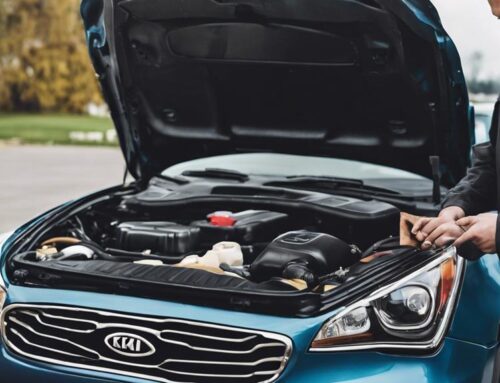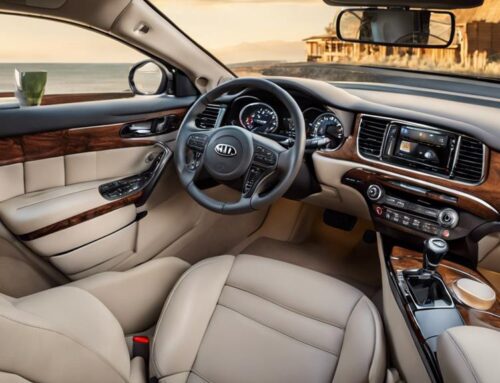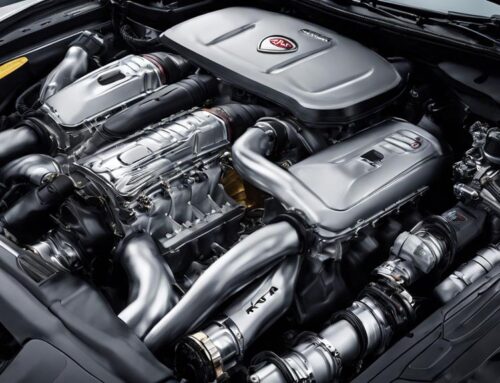Prius ignition problems often stem from faulty spark plugs, ignition coils, or battery health issues. Confirming spark plugs and coils are in good condition is essential. Check your 12-volt auxiliary battery for charge levels and corrosion. Key fob malfunctions, blown fuses, and immobilizer issues can also prevent the car from starting. Regularly inspect and clean your battery terminals. If the problem persists, reprogram or replace the key fob. Keep up with preventive maintenance to avoid these issues. By addressing these areas, you'll guarantee smoother operation and prevent minor issues from escalating. Explore further to uncover more detailed solutions.
Key Takeaways
- Faulty spark plugs or ignition coils can cause the Prius to misfire and have rough idling.
- Corroded battery terminals disrupt power flow, leading to ignition issues.
- Blown fuses disrupt electrical flow, causing ignition failure.
- Key fob battery issues or malfunctions can prevent the car from starting.
- Immobilizer system malfunctions can cause the engine not to start or shut off immediately.
Common Ignition Issues
When dealing with common ignition issues in a Prius, you might encounter problems like faulty spark plugs and ignition coils. These components are essential for starting your vehicle, and when they fail, you'll likely face difficulties igniting the engine. Regular maintenance and inspection of these parts are vital to keep your Prius running smoothly.
Faulty spark plugs can cause misfires, leading to rough idling and poor acceleration. Ignition coils, responsible for converting battery voltage into the spark that ignites the fuel, can also degrade over time. When they malfunction, you might notice dashboard malfunctions and other electrical issues. Addressing these problems promptly can prevent more severe damage.
In addition to spark plugs and ignition coils, other elements like the ignition switch, wiring, and key fobs can contribute to ignition problems. A faulty ignition switch or loose wiring connections can disrupt the electrical flow, making it difficult to start your Prius. Similarly, a malfunctioning key fob can prevent the ignition system from recognizing the signal needed to start the car.
For complex issues, seeking professional diagnosis and repair by a certified Toyota mechanic ensures that the problem is accurately identified and resolved, giving you control over your vehicle's performance.
Battery Health Check
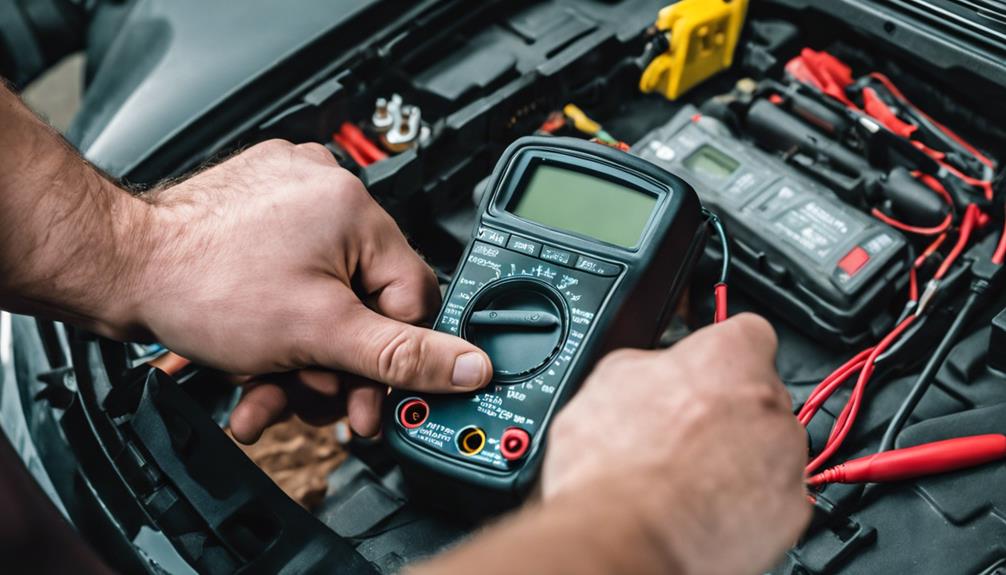
Regularly checking your Prius's 12-volt auxiliary battery health is crucial for maintaining ignition system reliability. Ignoring this critical component can lead to frustrating ignition problems. Start by inspecting the battery terminals for corrosion. Corroded terminals disrupt power flow, making it difficult for your ignition system to function properly. Clean any corrosion you find with a mixture of baking soda and water, guaranteeing a secure connection.
Monitor the battery charge levels regularly. A weak or undercharged battery can cause ignition issues. Use a multimeter to check the voltage; it should read around 12.6 volts when fully charged. If the reading is notably lower, consider recharging or replacing the battery.
Pay attention to the battery cooling system as well. A malfunctioning cooling system can cause the battery to overheat, leading to cell damage and reduced performance. Ensure that the cooling fan is operational and the vents are not obstructed.
Lastly, be mindful of the battery's overall condition. Faulty cells within the battery can lead to unreliable ignition. If you notice any signs of swelling, leakage, or unusual smells, replace the battery immediately. Keeping your 12-volt auxiliary battery in top shape gives you control over potential ignition problems.
Key Fob Problems
A faulty key fob can wreak havoc on your Prius's ignition system, preventing the car from starting and rendering keyless entry useless. When your key fob isn't recognized by the vehicle's system, you might find the dashboard lights staying dark and the engine refusing to turn over. This can be incredibly frustrating, especially when you're in a rush.
To regain control, first check the key fob's battery. A dead or weak battery can easily cause these issues. Replacing the battery is a simple, important fix. If the problem persists, your key fob might need reprogramming. This can often be done by following your owner's manual, but if you're not comfortable with this, professional assistance is always an option.
Sometimes, the key fob itself might be defective. In such cases, replacing the key fob is the best course of action. Ensuring your key fob is in good working order is important for the seamless operation of your Prius's ignition and keyless entry system. By proactively addressing key fob problems, you can maintain control over your vehicle's functionality and enjoy a smoother driving experience.
Fuse Inspection
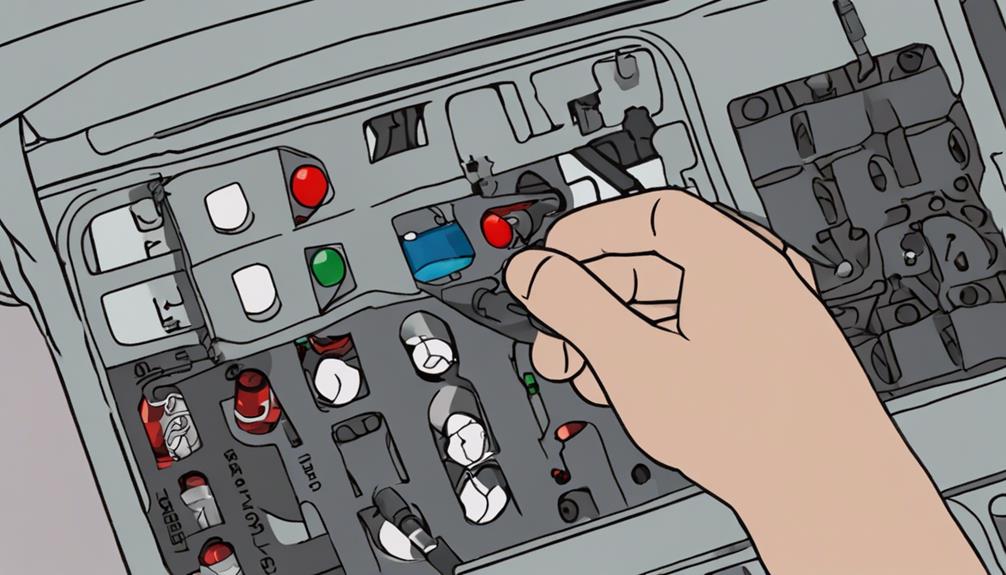
Inspecting the fuses is an essential step in diagnosing ignition problems in your Prius. Blown fuses can disrupt the electrical flow, leading to issues like a dashboard blackout and ignition failure. To get started, locate the fuse boxes under the instrument panel and in the engine compartment. These areas are critical checkpoints where potential faults in the ignition system often occur.
Use an ohmmeter to check for continuity in each fuse. This tool helps you determine if a fuse is functioning correctly. Place the ohmmeter's probes on both ends of the fuse and look for a reading. A zero or near-zero reading indicates a good fuse, while a high reading or no reading at all means the fuse is blown and needs replacing.
Maintaining and replacing damaged fuses regularly can prevent these ignition issues from happening. By proactively inspecting your fuses, you're ensuring your Prius operates smoothly. Don't overlook this simple yet important task. Once you've checked all the fuses and replaced any that were faulty, you'll have taken a significant step toward diagnosing and solving the ignition problems in your Prius.
Security System Faults
When your Prius won't start, security system faults like key fob issues or immobilizer system malfunctions could be the culprits. If the car can't recognize the key fob, the ignition won't engage, leaving you stranded. Addressing these problems might require reprogramming the key fob or fixing communication errors between the key and the immobilizer.
Key Fob Issues
Key fob issues can greatly impact your Prius's ignition system, often leading to security system faults that prevent the car from starting. When your key fob malfunctions, it might not communicate properly with your Prius, causing ignition problems. This lack of communication can halt your plans and leave you stranded, which is frustrating for anyone who values control over their vehicle's reliability.
To troubleshoot key fob issues, start by checking the battery. A weak or dead key fob battery can easily disrupt the signal needed to start your Prius. Replacing the battery is a simple fix that often resolves the problem. If the issue persists, inspect the key fob for physical damage. A cracked or broken key fob could interfere with its functionality.
Additionally, make sure your key fob is properly programmed to your Prius. Sometimes, reprogramming the key fob can solve communication glitches. If you're still facing problems, it might be time to consult your vehicle's manual or contact a professional for further diagnosis and repair.
Immobilizer System Malfunctions
Immobilizer system malfunctions in your Prius can prevent the engine from starting or cause it to shut off immediately after starting. This system is vital for your car's security, guaranteeing that only authorized keys can start the engine. When it malfunctions, it can leave you stranded and frustrated.
Common symptoms of immobilizer faults include:
- Engine doesn't start
- Engine starts then shuts off immediately
- Dashboard warning lights related to the security system
- Error messages on the display screen
- Inconsistent recognition of the key fob
These issues are often caused by problems with the key fob, the key recognition system, or the immobilizer control module. For instance, a weak or dead key fob battery can prevent the system from recognizing the key. Similarly, a malfunctioning immobilizer control module can fail to communicate with the car's engine.
To regain control, you'll need to troubleshoot these components. Start by checking the key fob battery and replace it if necessary. If the problem persists, you may need diagnostic tools to pinpoint the issue. Consulting a professional with expertise in Prius security systems can save you time and ensure a proper fix.
Fuel System Troubles
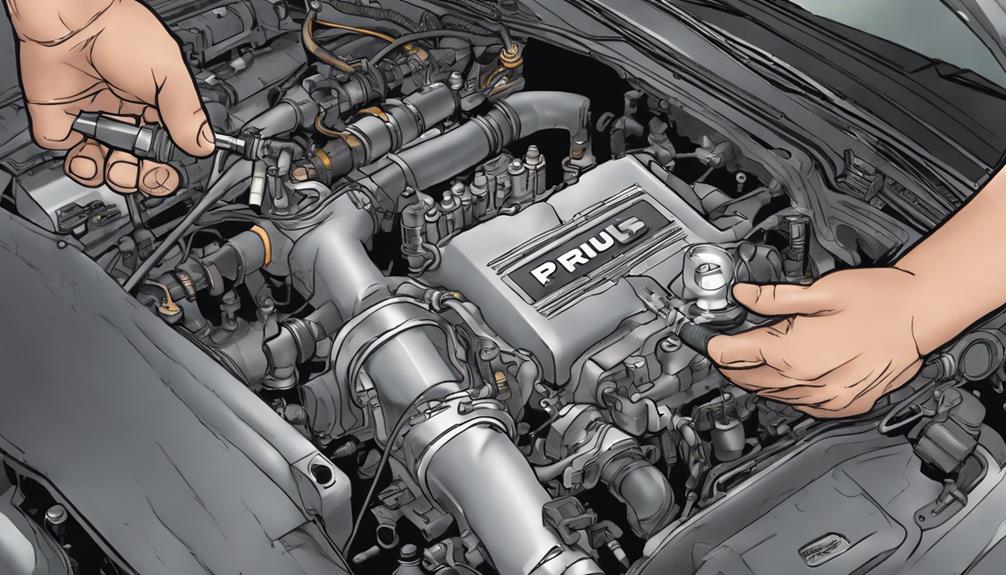
A clogged fuel filter in your Prius can greatly restrict fuel flow to the engine, causing ignition problems. When the filter is blocked, your engine won't receive the fuel it needs, making it hard to start or even preventing it from starting entirely. Regularly checking and replacing the fuel filter can keep this issue at bay.
Contaminated fuel is another culprit that can lead to ignition issues. If you suspect your fuel is dirty, it's important to drain the tank and refill it with clean fuel. This guarantees that your engine gets a proper mix and can ignite without any hitches.
A malfunctioning fuel pump can also spell trouble for your Prius. The fuel pump is responsible for delivering fuel from the tank to the engine. If it's not working correctly, the engine won't get enough fuel, making ignition difficult. Testing the fuel pump's pressure and replacing it if necessary can solve this problem.
Lastly, clogged fuel injectors can disrupt fuel spray patterns, leading to ignition issues. Using a fuel injector cleaner or having them professionally cleaned can restore proper function. Keeping an eye on fuel levels is also essential; running on low fuel can cause the system to struggle, impacting ignition.
Overfilled Engine Oil
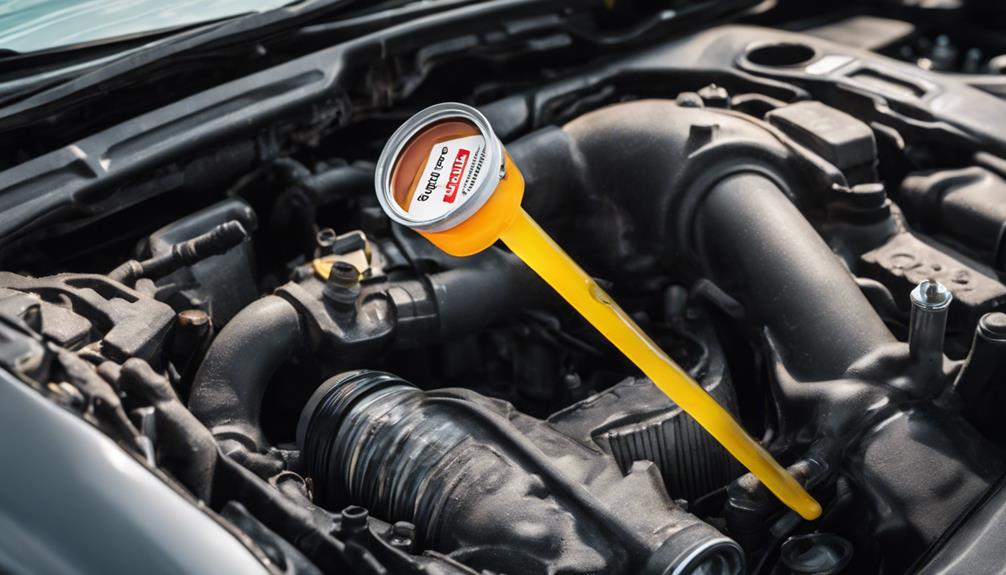
Overfilling the engine oil in your Prius can cause excessive pressure, leading to oil leaks and potential engine damage. You'll notice symptoms like increased friction, overheating, and oil foaming, which compromise the engine's lubrication. To avoid these issues, always adhere to the manufacturer's oil capacity guidelines and regularly check the oil levels.
Oil Overfill Impact
Excess engine oil in your Prius can lead to increased pressure and a host of performance issues. When you overfill the engine oil, it's not just a vital inconvenience; it can have serious consequences for your vehicle's operation and longevity.
Here are some critical impacts of overfilling engine oil:
- Increased Pressure: Excess oil causes higher pressure within the engine, which can lead to leaks and gasket failures.
- Foaming: Overfilled oil may foam, introducing air bubbles that reduce lubrication efficiency. Air bubbles don't lubricate, leading to metal-on-metal contact.
- Oil Starvation: Paradoxically, too much oil can result in oil starvation, where key engine components don't receive adequate lubrication, causing wear and tear.
- Oil Leaks: Elevated pressure can force oil past seals and gaskets, leading to leaks that can be both messy and damaging.
- Reduced Performance: Foamy oil and reduced lubrication efficiency can impair engine performance, affecting everything from fuel efficiency to acceleration.
To keep your Prius running smoothly, it's essential to regularly check and maintain proper oil levels. This simple habit can prevent many costly and inconvenient ignition problems down the line. Take control of your vehicle's health by ensuring you never overfill the engine oil.
Symptoms of Overfill
You'll notice several telltale signs if your Prius has overfilled engine oil. First, keep an eye out for white smoke billowing from the exhaust. This smoke indicates that oil is being burned in the combustion chamber, a direct result of overfilling. Another symptom is engine misfires, where the engine might hesitate, stumble, or run unevenly due to oil interfering with the spark plugs.
You might also see oil leaks around the engine. Overfilled oil increases pressure within the engine, forcing oil past seals and gaskets. This can cause visible leaks and even more serious internal damage. Additionally, you'll likely notice increased oil consumption, as the engine burns off the excess oil, leading to frequent top-ups.
An overfilled engine can cause the oil to foam, reducing its lubrication efficiency. This can result in potential engine overheating, as the oil fails to adequately cool and protect moving parts. You might also experience reduced fuel efficiency and even engine stalling, as the oil disrupts normal engine operations.
Address these symptoms promptly to prevent costly repairs and maintain your Prius's top-notch performance. Recognizing these signs early will help you manage and resolve the issue effectively.
Preventive Measures
Recognizing the symptoms of overfilled engine oil is just the first step; taking preventive measures is key to maintaining your Prius's health. Overfilling can lead to increased pressure, potential leaks, and damage to engine components, which can affect performance and cause ignition issues. To prevent these problems, follow the manufacturer's guidelines for oil changes and maintain peak engine health.
Here are some preventive measures to make sure you don't overfill your Prius's engine oil:
- Regularly check oil levels: This simple step helps you keep track of the oil levels and prevents overfilling.
- Follow manufacturer guidelines: Stick to the recommended oil change intervals and quantities specified in your Prius's manual.
- Use the correct tools: When checking and changing oil, use the appropriate tools and techniques to avoid overfilling.
- Consult a professional mechanic: For accurate oil changes and expert advice, don't hesitate to seek help from a professional.
- Monitor for leaks: Keep an eye out for any signs of oil leaks, as they can indicate overfilling and other issues.
Cleaning Battery Terminals
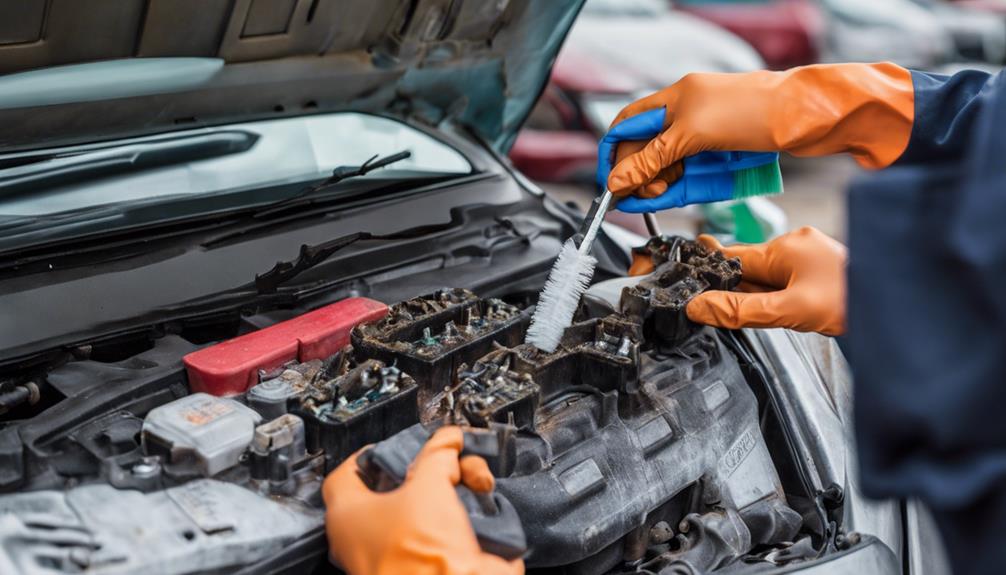
Cleaning battery terminals is essential for maintaining a strong electrical connection and guaranteeing your Prius starts reliably. Corrosion on battery terminals can create a barrier, preventing the proper flow of electricity needed to start your vehicle. If you've noticed your Prius having trouble starting, dirty or corroded battery terminals might be the culprit.
To clean your battery terminals, first gather a mixture of baking soda and water. This simple concoction effectively neutralizes and removes corrosion. Apply it generously to the terminals. Then, use a wire brush or a specialized terminal cleaning tool to scrub away any stubborn buildup. This step ensures you're removing all corrosion that could impede connectivity.
Regularly cleaning your battery terminals is a proactive measure that can prevent ignition problems and extend the life of your battery. By staying on top of this simple maintenance task, you keep your electrical system in excellent condition, giving you more control over your vehicle's reliability. Don't wait for problems to arise—integrate terminal cleaning into your routine maintenance schedule to keep your Prius running smoothly. It's a small effort that pays off with dependable performance every time you start your car.
Replacing the Battery
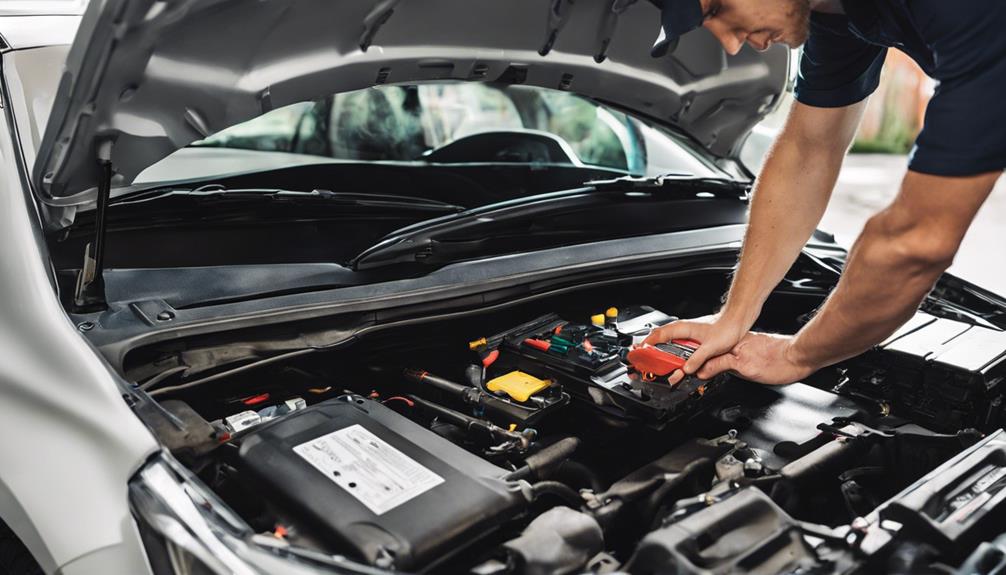
Wondering if it's time to replace the 12-volt battery in your Prius? If your dashboard lights are dim, you hear strange sounds during startup, or your car struggles to start, these are clear signs that your battery might be failing. Replacing it can be straightforward if you know what you're doing.
First, locate the 12-volt battery in the trunk. You'll need to remove some storage bins to access it. Before you disconnect anything, check the terminals for corrosion. Clean them if necessary to guarantee a good connection. Here's a quick checklist to keep you on track:
- Locate the battery: It's in the trunk, under storage bins.
- Check for corrosion: Clean the terminals if needed.
- Disconnect safely: Remove the negative terminal first, then the positive.
- Install the new battery: Ensure it's seated properly.
- Reconnect terminals: Attach the positive terminal first, then the negative.
While you might be tempted to go the DIY route, seeking professional help can ensure proper installation and reliable operation. They'll make sure everything is connected correctly, giving you peace of mind and a smoothly running Prius. Remember, a well-maintained battery is important for preventing ignition problems.
Preventive Maintenance Tips
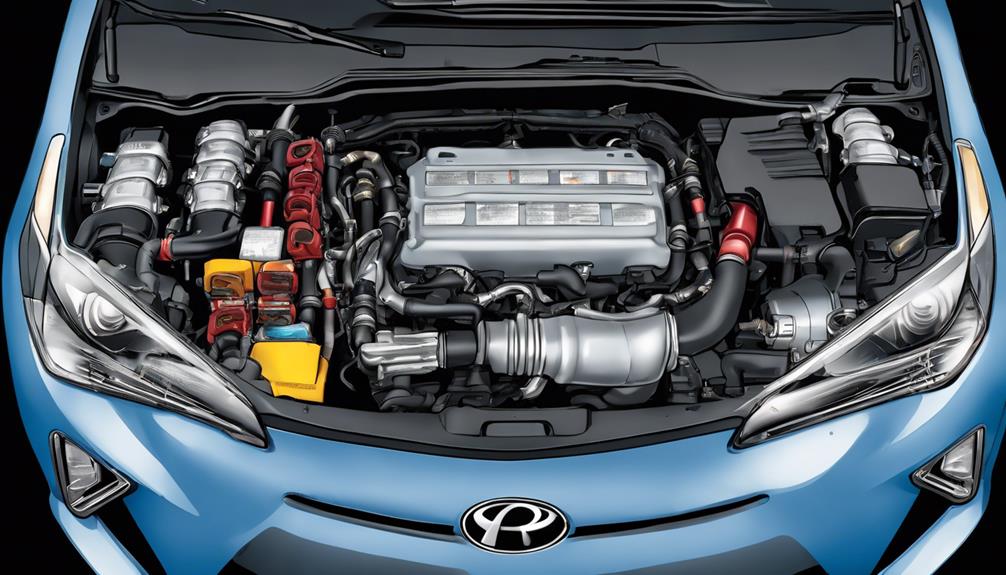
Maintaining your Prius through regular preventive measures can save you from future ignition headaches. Start by inspecting and cleaning your battery terminals regularly. Corrosion buildup can disrupt power flow, leading to ignition problems. A simple cleaning can keep your battery in top shape.
Stick to the manufacturer's recommended schedule for spark plug replacement. Efficient spark plugs are essential for a reliable ignition and smooth engine start. Don't let worn-out plugs sabotage your vehicle's performance.
Your fuel system needs attention, too. Use high-quality fuel and schedule regular cleanings to keep the injectors clog-free. This practice guarantees a steady fuel flow, preventing ignition issues.
Hybrid system maintenance is equally important. Monitor your hybrid battery's health and address any warning lights immediately. Ignoring these signs can lead to more severe problems down the line.
Lastly, be vigilant about unusual sounds, dashboard warnings, or starting difficulties. Don't delay consulting a certified Toyota mechanic. Prompt action can prevent minor issues from escalating into major ignition failures.
Taking control of these preventive measures keeps your Prius running smoothly and minimizes the risk of unexpected ignition troubles.
Frequently Asked Questions
How Does Extreme Weather Affect Prius Ignition Performance?
Extreme weather affects your Prius ignition performance to a large extent. Cold weather can reduce your hybrid battery's efficiency and thicken engine lubricants, making it harder to start. The 12-volt auxiliary battery and fuel system can also suffer, leading to potential freeze-ups and ignition issues. To maintain control, consider using battery blankets or engine block heaters. These solutions can help mitigate the adverse effects of extreme temperatures on your Prius.
Can Aftermarket Parts Cause Ignition Issues in a Prius?
Did you know that using aftermarket parts can increase ignition problems in a Prius by up to 50%? You want control over your vehicle's performance, right? Aftermarket parts often don't meet the quality standards of OEM parts, leading to malfunctions. They might not communicate well with your hybrid system, causing errors. Stick with genuine OEM parts to guarantee your Prius runs smoothly and avoid unnecessary ignition issues.
What Are the Symptoms of a Failing Prius Ignition Switch?
If your Prius ignition switch is failing, you'll notice symptoms like difficulty turning the key, intermittent power loss, or the engine not starting. You might see dashboard warning lights flickering, experience stalling while driving, or have the engine shut off unexpectedly. Additionally, the key could get stuck in the ignition, or the engine might start and then immediately die. Act quickly and get it inspected by a qualified mechanic to avoid further issues.
How Often Should I Inspect My Prius Ignition System?
Consistent care counts! You should inspect your Prius ignition system annually or every 12,000 miles. Regular checks help you catch potential problems early, preventing unexpected hiccups and ensuring your car runs smoothly. Incorporating ignition system inspections into your routine maintenance schedule boosts your Prius's reliability and longevity. If you encounter complex issues, consider professional servicing to maintain control over your vehicle's performance.
Are There Software Updates That Can Resolve Ignition Problems in a Prius?
Yes, there are software updates that can resolve ignition problems in your Prius. These updates improve system functionality by addressing glitches, bugs, or compatibility issues affecting the ignition process. You should regularly check for software updates to make sure your vehicle operates smoothly. Toyota dealerships or authorized service centers can perform these updates, enhancing your driving experience and preventing potential ignition issues. Taking control of this maintenance is vital for top performance.

